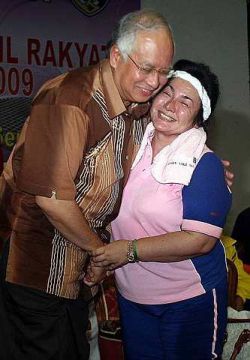“If he stamps his feet, I will shudder.”
– Datin Seri Rosmah, describing her husband; whilst overzealously trying to portray a mousy image of herself.

“ … do not provoke him. If he is angry, there is no forgiveness for you.”
– again, Datin Seri Rosmah, attempting to conjure a rather fearsome image of her husband.

“The motorcyclist was also not wearing a helmet and had no driving licence”
– Gerik OCPD Superintendent Mahad Nor Abdullah, citing one of the reasons why the motorcyclist was presumed to be at fault when he was knocked down and killed by the 4WD driven by the former Perak Mentri Besar, Tajol Rosli Ghazali.
Author Archive
Quotable Quotes
Posted by Oscar the Grouch on February 21, 2010
Posted in Uncategorized | 8 Comments »
The MCA’s Single EGM: Whose resolution to come first?
Posted by Oscar the Grouch on September 6, 2009

I don’t really care much about the MCA feud between Ong Tee Keat and Chua Soi Lek. However, I’ve been privy to corporate litigation and board tussles. I’ve seen directors and shareholders battle it out in board rooms. Every move is carefully planned and crafted, for a wrong move may spell disaster in favour of the opponent.
Perhaps that is why I’ve taken an interest in the MCA’s EGM. There is – and will be – more than meets the eye.
Chua Soi Lek may be a cunning politician, who apparently commands the support of the grassroots and several ex-MCA strongmen. But one must not too easily discard Ong’s ability to fend off his enemy technically by way of an EGM.
When Chua’s supporters went around garnering support to call for an EGM to reinstate him and to remove Ong Tee Keat; Ong, in response, quickly called his own EGM. Although no agenda was cited, it is expected that Ong’s EGM is to seek a vote of confidence in his leadership as well as to endorse Chua’s sacking.
Then it was reported that MCA’s sec-gen, Datuk Wong Foon Meng proposed a move to have a single EGM, citing a merged EGM would not inconvenience the members and to further divide the party. These reasons are quite daft and nonsensical considering the seriousness of the crisis. Costs and inconveniences should be the least of the matters to worry about.
Currently, both sides are not yet in full agreement of the single EGM. Issues relating to submission and exchange of resolutions are still at the works, with Soi Lek’s camp asking for the resolutions being exchanged, but Ong still keeping his resolution “top secret”.
Apart from keeping the resolutions “secret”, there will also be an issue of whose resolution will be heard first. This, I think, will be crucial.
For example: if Ong’s motion is first on the list, which means it will be heard and debated first. If it is then called for a vote and passed immediately, then that makes Chua’s resolution redundant and academic, without even being heard and debated. This is one way to foil Chua’s attempt to remove the president.
I’m not aware of how the MCA’s constitution operates, but in most cases, the Chairman of the meeting wields great authority in the running and conduct of the meeting. Many things can be done against an opposing party.
If Ong is not afraid no face his opponents, he should just allow Chua’s supporters to call for their EGM, rather than complicating the situation by calling a double EGM, and then justifying a merged EGM. The problem of the double EGM is his doing, not Chua.
There will be no problem of a double EGM if Ong had stayed mum. If during the EGM, the members do not vote to support Chua’s motion, then this is as good as an endorsement of Ong’s leadership. But for Ong to do all this shows a hidden agenda.
There will be even more technical problems arising from such an exercise, which will – in the end – in a prolonged legal suit comparable to the Perak debacle.
With his way of calling a double EGM; by him being secretive of the proposed resolutions; by his early warning to the party’s disciplinary board to lookout for money-politics in the EGM – perhaps a technical win or a protracted legal suit is exactly what Ong Tee Keat hopes for to keep his position afloat.
Posted in Uncategorized | Tagged: chua soi lek, MCA, ong tee keat | 3 Comments »
FIC was never legal anyway
Posted by Oscar the Grouch on July 2, 2009

Now that Najib has announced the disbanding of the Foreign Investment Committee (FIC), and the ending of the FIC Guidelines, I’m sure many of us have our personal thoughts on the issue.
Some may think that the doing away of the 30% bumiputera requirement is a good thing; others may think its replacement with requirement of 50% stake of public offering in listing companies makes the whole exercise redundant and superfluous.
However, I’m not going to touch on those issues. I want to highlight some revelations on the FIC which I think most Malaysian knows not of.
The FIC was set up on 20th February 1974 to promote and protect the New Economic Policy that has just been implemented then.
The FIC comes under the auspices of the Economic Planning Unit (EPU). The EPU itself is not a ministry or government department – but as the namesake suggests – it is the economic planning unit of the Prime Minister’s Department. Over the years, this subsection has become increasingly powerful, overshadowing even that of other Ministries. In fact, some Ministries have become indirectly subservient to the EPU, waiting for directions before implementing or embarking on any governmental projects.
The FIC is merely a committee – albeit a powerful one – consisting of senior civil servants led by the Director-General of the EPU.
The FIC has – over the years – issued many guidelines, commonly known as the FIC Guidelines, to regulate and coordinate matters on foreign investment, acquisition of assets or interest, mergers and takeovers of companies and businesses by both local and foreign investors.
Once the FIC Guidelines is imposed to a particular transaction, the parties would have to apply to FIC for approval. The FIC will then impose conditions for approval. The conditions include: –
• for companies with less than 30% Bumiputera equity, to increase the Bumiputera equity to at least 30%;
• for companies with more than 30% Bumiputera equity but less than 50%, to maintain the Bumiputera equity at least at 30%;
• for companies with more than 51% Bumiputera equity, to maintain the Bumiputera equity at least at 50%;
What we need to understand is this – the FIC is not a proper ministry or body set up under the law. It is merely a committee. It is, to put it crudely, a working group; or at most, a board, with no real executive powers given in law.
Consequently, the FIC Guidelines also do not have force of law. It is not an Act of Parliament. It is not a law or by-law. It is merely a guideline, or garispanduan. None of us need to follow it.
This issue has been taken up in the courts. In the case of Ho Kok Cheong Sdn Bhd & Anor v Lim Kay Tiong & Ors (1979) 2 MLJ 224, the High Court confirmed that the FIC Guidelines have no force of law. The judge, Justice Wan Hamzah said: –
“The guidelines were issued not pursuant to any power given by law, and in my opinion they have no force of law but are of advisory character merely. I do not think that non-compliance with the guidelines can be taken as an act opposed to public policy. The guidelines reflect the government’s political policy but government’s political policy is not public policy.”
In a later case of Malaysia Overseas Investment Corporation Sdn Bhd v Sri Segambut Supermarket Sdn Bhd (1986) 2 MLJ 383, the High Court again re-affirmed its stand on the FIC Guidelines when Justice Siti Norma Yaacob held that the guidelines have: –
“… no force of law but of advisory character only and non-compliance whatsoever will have no effect as to the legality or otherwise of the contract.”
If the FIC Guidelines have no force of law, what happens if we don’t comply with it? The answer is nothing.
In the case of Thong Foo Ching & Ors v Shigenori Ono (1998) 4 MLJ 585, the Court of Appeal held that non-compliance of the FIC Guidelines would have no effect on the parties and the transaction. Justice Siti Norma Yaacob, now sitting in the Court of Appeal, explained the court’s decision as follows: –
“A reading of the guidelines shows that there is no penalty imposed for non-compliance of any of their provisions. From the nature of the document itself and its purpose to eradicate poverty by restructuring the Malaysian society so as to correct any racial economic imbalance, at most I would say the guidelines impose a moral obligation only on those affected to comply with their provisions.”
So, in the midst of all the hullaballoo of the end of the FIC and the de-regularisation of the Guidelines, let us pause to think of all the Malaysians that have been hoodwinked into complying with a 30% equity requirement that was never valid or legal in the first place.
Posted in Oscar the Grouch | Tagged: Economic Planning Unit, FIC, FIC Guidelines | 20 Comments »
Complexities of Construction Liability
Posted by Oscar the Grouch on June 9, 2009

Days after the collapse of the Jaya Supermarket and the Sultan Mizan Zainal Abidin Stadium in Terengganu, the lay-blame game begins. In the case of the Jaya Supermarket, the Petaling Jaya City Council hastily declared that the architect in charge of the demolition is solely responsible under the local by-laws. Similarly, in the case of the Terengganu Stadium, fingers were quickly pointed at the PWD, the architects and the contractor. And all these happened even before any probe or a commission of inquiry was established to investigate the cause of the collapse. This only shows the mentality of the authorities in understanding issues on construction liability.
It is always a complex issue when a building collapses. It is difficult to ascertain liability. First of all, we have to find out the cause of the collapse. That itself is a near-impossible task. For example, if a house is found to have cracks on its wall, then the owner should appoint consultants or experts to inspect the cracks. The consultants or experts may produce a report that the house owner may rely on to decide on the next course of action. But if the house collapses before an inspection is undertaken, then it will no longer be possible to check on anything as the whole structure has fallen to debris. There is no more evidence to rely or inspect upon. The cause of the collapse will only be a guessing game.
In the case of the Highland Tower collapse in 11 December 1993, the owners of Block 2 and 3 (the unaffected units) sued for damages. The court had to ascertain the cause of the collapse. To help the court decide, two top personalities in the field of geo-technological engineering in the world were asked to give their views. Both came up with conflicting reports. In the end, the court had to choose between one to another. Even the top experts cannot agree as to the cause of the landslide. Based on the conflicting theories, it is safe to say that the cause of the Highland Tower landslide will never be accurately known.
There is also another problem arising in this area. In cases of latent defects, the damage takes place underground in the foundations or inside the walls so at the time of its occurrence it is unknown and undiscoverable. The damage caused by the defective work may not become apparent even until the completion of the project and its untimely collapse.
In the event we are able to conclude – against the odds – on the exact cause of a collapse, we now have to connect the cause of the collapse to the responsible party. This is not going to be easy. There are many parties involved in the construction of a building. There is the owner – the one who commissions for the construction of the building. The owner will appoint an architect to design the building.
Once the design has been drawn out, other professionals such as engineers and quantity surveyors will be appointed to conduct engineering and surveying work. It is also common for project managers to be hired to oversee the project. All the necessary building approvals in respect of the construction will be made to the authorities. Tenders will then be given to appoint builders or contractors to construct the building. In big projects, a main contractor will be appointed. The main contractor will then appoint sub-contractors – some of them specialist in their own field – to do part of the job. Lastly, there are suppliers who supply the building materials to the contractors.
With so many parties involved, we have to carefully link the cause of a building collapse to the correct responsible part. For example, if the cause were due to negligent design, then the architect would be liable. Similarly, the architect can also be liable for negligent certification, negligent supervision and negligent inspection. A project manager can also be liable for supervision and inspection if they are so appointed for the task and fail to act reasonably. If the cause is due to negligent construction or negligent workmanship, then the main-contractor or the sub-contractor may be liable. If it is negligent approval, then the authorities may be liable. Suppliers may be liable if inferior materials are being supplied.
However, liability of a party is never clear-cut. If a builder is expressly instructed by the owner to use inferior materials, and the builder in such a case have expressly advice against the use of such materials, can the builder then expressly disclaim liability and responsibility by contract to the owner? Similarly, whether a particular problem was caused by inadequate supervision would be influenced directly by the amount of resources the architect was required to deploy on supervision. Unlike design, supervision costs are entirely time and labour related. It is largely for the client and the consultant to negotiate and decide how much resource should be applied to secure supervisory functions beyond the minimum required.
Construction liability is additionally made more difficult by the defence of Act of God. This is a defence readily employed in cases of landslides. Act of God has been described where an escape occurred through natural causes and without human intervention in circumstances that no human foresight can provide against and of which human prudence is not bound to recognize. Lightings, earthquakes, cloudburst and tornadoes may amount to an Act of God.
Once we are able to ascertain the cause of a collapse and correctly linking it to the responsible party or parties, we then have to consider the type of liabilities attracting the careless act. Liability can be three types: – contract, tort and statute. A construction project is managed by an intricate web of contracts to define their relative rights and responsibilities. An owner may have signed a contract with the main-contractor but not with the sub-contractors or suppliers. The architect or engineer has no contract with the contractor. Where there is no contract, parties may then rely on the law of negligence to impose tort duties to cut across contractual lines. A party may also be additionally liable under a statute, such as the Occupational Safety and Health Act 1994.
With such a complex area to grapple and understand, the government should take other pro-active steps to avoid future disasters. The passing of the Construction Industry Development Board Act 1994 and the Occupational Safety and Health Act 1994 is a good move. But it is not good enough. Perhaps we can take a cue from neighbouring Singapore. In 1987, the Hotel New World collapsed. It is the first ever collapse of a building in Singapore. Following the recommendations of the Report of the Inquiry and the Report of the Select Committee on the Building Control Bill (Bill No. 3/88), the Building Control Act 1989 was enacted.
The Singapore Building Control Act 1989 introduced several new measures to regulate the construction industry. In regulating the design and supervision of a construction building, a developer must appoint an Accredited Checker, whose main duties are to evaluate, analyze and review the structural design in the plans of any building works and perform such original calculations with a view to determining the adequacy of the key structural elements of the building to be erected or affected by the building works carried out in accordance with those plans. The Accredited Checker must be independent in that he must have no professional or financial interest in the building works.
Apart there from, the Building Control Act also regulates workmanship and materials by empowering the Minister to make regulations on the suitability and use of materials and components. Any building regulations may adopt any code, standard, rule, specification or provision which is recommended, issued or adopted by the Productivity and Standards Board of Singapore or the British Standards Institution. In the later Building and Construction Authority Act passed in 1999, the Singapore’s Building and Construction Authority has been empowered to prescribe standards for the construction industry in relation to design, processes, construction techniques, products and materials.
Singapore’s Building Control Act 1990 also provides for periodical inspection of buildings by an independent structural engineer. The appointed structural engineer must carry out the inspection, prepare, sign and deliver a copy of the report to the Building Authority. If the report contains any measure or other recommendations to be carried out to ensure the structural stability or integrity of the building, the owner must carry out the same within the period as may be specified by the Building Authority. The Building Authority may, if it appears that a building is in such a condition as to be likely to be dangerous, order the owner to carry out or cause to be carried out such inspection of the building as he may specify and/or to execute such building works as may be necessary to obviate the danger and/or to demolish the building or any part thereof. Alternatively, the Building Authority may order the closure of the building.
In summary, we are able to see and appreciate that construction liability is a complex issue. Finding a cause of a collapse of a building is never easy. For most of the time it will be a guessing game or a process of elimination. With so many parties involved in a constructions project, it will also be difficult to ascertain who is liable for what. With so many uncertainties and issues at hand, it is best for the Government to take pro-active steps to better regulate the construction industry. The developments in Singapore would be a good starting point for us to compare and emulate. The current existing laws that we have may not be adequate and may need to be improved on.
Posted in Oscar the Grouch | Tagged: Construction Law, Construction Liability, Jaya Supermarket collapse, Stadium Sultan Mizan Zainal Abidin collapse | 12 Comments »
Coretan buat Kak Min…
Posted by Oscar the Grouch on June 1, 2009

Sayang sekali Kak Min; semuanya sudah berakhir
Kak Min patut tahu: kemenangan memanglah mustahil
Terkilan aku melihat keputusan pilihanraya kat TV
Sayang sekali, Kak Min sudah kalah teruk di Penanti.
Kesian juga bila tengok jumlah undi yang Kak Min dapat
Tiga ratus lebih saja, mengikut keputusan muktamad
Yang si Mansor Othman tu dapat enam ribu lebih
Malu-lah Kak Min, nak menang pencabar Siam pun tak boleh.
Taktik-taktik kotor Kak Min ni memang tidak menjadi
Tuduhan-tuduhan rasuah Kak Min pun tidak membawa apa-apa publisiti
Hari-hari Kak Min keluar TV tumpang glamour tak membawa kesan
Hari-hari rakyat tengok kelakar Kak Min pun naik bosan.
Hang rasa mungkin Kak Min buat cara salah
Kak Min hantar rakaman cakera padat bagi kat SPR buat apa?
Kalau memang Kak Min nak tunjuk kat kita yang PKR sogok bayaran
Letak saja dalam Youtube; rakyat-jelata boleh terus buat penilaian.
Sekarang ni Kak Min dah tak ada kerja nak buat apa?
Tak kan-lah Kak Min bercadang nak menganggur sepenuh masa?
Saya cadang Kak Min apply jadi detektif Umno tangkap gambar rasuah
Mana tahu, lusa kelak Kak Min mungkin boleh jadi usahawan yang berjaya.
Posted in Oscar the Grouch | Tagged: Aminah Abdullah, Penanti Election | 13 Comments »
Let’s give a thought to the unfortunate in these trying times
Posted by Oscar the Grouch on May 20, 2009
These are truly trying times, especially with the economic downturn, coupled with deadly flu infection worldwide. Business is down. People are losing their jobs everywhere. To make matters worse, some are weighted down with further troubles, over and above their existing problems.
Take this man for example – Shahidan Kassim. He used to have a comfy job. He was the Menteri Besar of Perlis, from 1995 till 2008. The job came with a secure position, lots of clout, a decent salary and lots of perks. Shahidan has an official car with a driver, an official house with lots of other “official what-not”. It is a job better that a CEO of a multinational company.
But all good things must come to an end. Or to put it another way – in these trying times, one can fall from grace. This was what Shahidan had to go through. He fell with a loud thud. He lost his job.
Though now in his wilderness, a man would still do what a man has to do to feed his family. That was what Shahidan did. Instead of complaining bitterly about his hard luck, he quickly set out to look for another job. But for Shahidan’s case, he was a tad bit lucky. He was the president of the Perlis Football Association. So, he decided to devote his time and effort to being a good and full-time president of the PFA.
But as luck would have it, the PFA has fallen on hard times as well. No grants were channelled to the PFA. Their football stars were not paid their salary. The players sold their cars and cycled 25 miles to the stadium to play matches on empty stomachs. A benevolent Shahidan would see none of this. Although himself on hard times, he took it upon himself to pay the players salary from his own pockets. He claims to be now pokai because he has to spend up to RM200, 000 a month.
When Shahidan’s cash withered away, he carried on to help his players. He sought funds elsewhere. In the local Kosmo daily, he was reported to have said, “”Sekarang saya terpaksa berhutang untuk tanggung PFA, saya sudah keluarkan wang simpanan dan kini saya betul-betul ‘kering’ dan kena berhutang lagi untuk bayar gaji mereka (pemain dan pegawai). Saya menanggung PFA lebih daripada saya menjaga keluarga saya. Akibat tidak cukup wang untuk sara persatuan ini dengan ah long pun saya dah kena pinjam sekarang.”
Poor Shahidan! He has already lost his job, he has lost his money and now he owes the Ah Long!
We Malaysians do hate the Ah Longs. Why are they messing up the lives of good hardworking Malaysians? What can we do to stop the Ah Long menace? Will they take over the Perlis Football Association and turn it into Ah Long United FC and turn it into a world class club?
I strongly urge Michael Chong and the government to step in to help honest hardworking Malaysians like Shahidan Kassim (who have contributed so much and ask nothing in return) to combat hard times and to eradicate the Ah Long social ill once and for all. Please give Shahidan the chance that he deserves.
Posted in Oscar the Grouch | Tagged: Ah Long, Michael Chong, Perlis FA, Shahidan Kassim | 16 Comments »
Let’s take a cue from the British Monarchs
Posted by Oscar the Grouch on May 14, 2009
Catherine Masters is a nice old lady from Oxfordshire, England. Age 109, she is a grand old dame. Like all British centenarians, she receives a royal birthday card from the Queen. She got a card when she turned 100 and another when she turned 105, and every year thereafter.
But like most elderly ladies, Miss Masters can be a little picky. She wasn’t too happy about the birthday card. It has the identical picture year in year out – with the same image of Queen Elizabeth II, in the exact pose, and in the same yellow dress.
Perhaps Miss Masters was bored receiving the same type of card every year. Perhaps she felt it was impersonal. Perhaps she didn’t like the yellow dress. Whatever it was, she was inspired to write to the Queen to express her displeasure – which she did.
The letter reached Queen E. Did the Queen feel slighted? Did she feel upset, offended?
Hardly, in fact the Queen send her grandson, Prince William to apologise personally to Catherine Masters. Prince William visited Miss Masters at her nursing home and they both had afternoon tea. Not only did the Prince apologised, he assured Miss Masters that he will see to it that the image in the congratulatory card will be changed in time for Catherine Masters’ 110th birthday.
Following that, Catherine Masters have also been invited to a garden party with the Queen at Buckingham Palace in July.
Now, isn’t that something!
What do we Malaysians get from our monarchs?
For the people in Perak – they don’t need any birthday cards. They don’t need any congratulatory notes. And I don’t think they yearn for Raja Nazrin to have afternoon tea with them.
They just want their right to choose their own government. Is that too much to ask?
Posted in Oscar the Grouch | Tagged: British Monarchs, Catherine Masters, Queen E, Sultan of Perak, the Perak Constitutional Crisis | 5 Comments »
The Hero of Malaysia – V Sivakumar
Posted by Oscar the Grouch on May 8, 2009
Dear Mr. Speaker,
We, the Dandelions salute you. You are the hero – You da’ man – Jantan Tulen.
Just when we – the citizens of Malaysia – thought there is no one else worthy in the realm of politics, you prove to us that a Malaysian can be a hero. Better than any Rajnikanth … ever.
You have shown great courage – standing alone in battle – against the mighty combined forces of the Federal Government, the Monarchy and the Police.
You did not step aside – you did not budge – you did not waver. I had expected you to falter. After all, any ordinary man would.
But you held on, demonstrating nerves of steel.
And held on you did – from morning till three in the afternoon – before you were physically removed from the speaker’s chair.
Had you not been so roughly and bodily manhandled, I bet you can stay in that chair till all others drop dead from no water, starvation or sheer exhaustion.
I come to understand that you were mildly injured during the scuffle. Worry not, for you shall wear those physical scars proudly as your crowning glory for the people of Malaysia.
You are someone that our soldiers should emulate. Fight on – hold post – and never say die. They should erect a statue of you in every markas tentera, to instil on our young tentera’s heart the qualities of courage, bravery and valour.
I bow to you, dear sir, for you richly deserve my praise.
Thank you, dear sir. God bless.
Posted in Bangsa Malaysia, Current Affairs, Dandelions, Malaysia, Oscar the Grouch | Tagged: perak crisis, Perak Political Shits, the Perak Constitutional Crisis, V Sivakumar | 41 Comments »
Cabinet’s decision on conversion: – Syariah Lawyers & Zulkifli Nordin dissents
Posted by Oscar the Grouch on April 26, 2009
The Star’s columnist, Baradan Kuppusamy, was correct to say that even the most stringent of government critics – anonymous commentators on political blogs – have praised the decision by the Cabinet relating to the conversion controversy among spouses and their children.
However, as Mr. Kuppusamy points out, we will be waiting for this policy to be “… translated into legal effect for a just and lasting solution to this long-standing dilemma.“
In a turn of surprising events, we have the Malaysian Syariah Lawyers Association (PGSM) criticizing the Cabinet’s pronouncement. The PGSM views the decision as interference of legislative matters and threatens the freedom of the courts. PGSM’s deputy president, Musa Awang was quoted as saying that the courts must be free from interference from any party including the Government.
I would have to disagree. In order for the decision to be effected, the Government / Cabinet would have to introduce the new bill to Parliament. As long as the proposed bill on conversion is passed by both houses of Parliament and assented to by the Agung, it becomes law.
Once the new law on conversion is in place, the courts would have to apply it. The courts are bound to decide on cases pursuant to the laws passed by Parliament.
In that sense, I cannot see how the Cabinet’s decision as an interference of legislative matters and as threatening the freedom of the courts. Members of the Cabinet, who are also members of parliament sitting in the legislative institution, are empowered with legislative powers. The courts do not have legislative powers – they do not make law – they merely apply the law.
The PGSM appears to be getting everything muddled up. At the moment, it is merely a decision announced by the Cabinet. It is not yet law. Nor is the Cabinet instructing the courts. Until the new law comes about, the courts can still independently decide on existing laws.
Another person who appears a tad bit confused is PKR renegade, Zulkifli Nordin. He says the decision contradicts the Federal Constitution and the Federal Court decisions. He says that the issue has been addressed clearly by the Federal Court in the Subashini’s case, where the court stated that the issue is bound by Article 12 (4) of the Federal Constitution. (Art 12 (4) states that the religion of a person under 18 years shall be decided by his parents).
Well, Zulkifli Nordin is correct. The Federal Court had decided the case based on the existing laws at that time. But that does not mean the laws cannot be changed. Mr. Zulkifli appears to imply that laws cannot be changed. Well, there are good laws, and there are bad laws. If a law is bad, or produces unjust result, perhaps it is time for a change. Amend the Federal Constitution if need be. It is not as if our constitution has never been changed.
What is the problem then for Zulkifli Nordin and PGSM? The change will not operate retrospectively. Past decisions will not be affected. Why should a proposal to change a bad law be construed as interference to the courts? Zulkifli Nordin, as a member of parliament for Kulim, is free to veto against the bill when it is introduced at the Dewan Rakyat.
Posted in Uncategorized | Tagged: Conversion, Federal Constitution, Malaysian Syariah Lawyers Association, Zulkifli Nordin | 2 Comments »





